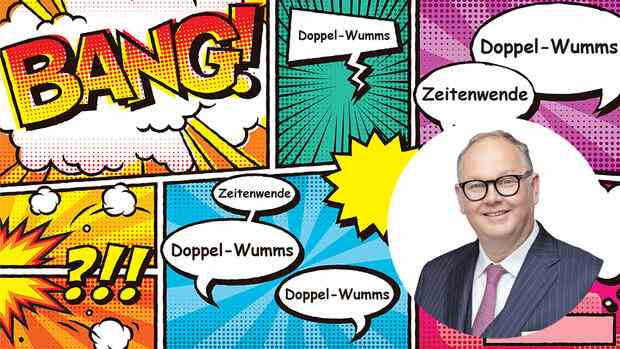It is a well-known phenomenon in physics: waves of different origins that overlap each other form new, difficult-to-predict patterns, strengthen or neutralize each other. They can lead to a standstill – or to a tsunami.
There are currently very similar phenomena in society, politics and business. The coincidence of events, the accumulation of problems and crises leads to a stress test for state and society, which requires prudence and determined, even unconventional action. Never since the end of the Second World War has this been brought home to us more clearly than in the year that is now drawing to a close.
There was also enough to do: reform backlog in the social systems, investment backlog in infrastructure and digitization, readjustment of foreign and economic policy. Anyone who wanted to could already foresee the impending disaster in Eastern Europe – but who wanted that back then?
Top jobs of the day
Find the best jobs now and
be notified by email.
Less than two months later, the emergency braking. crisis everywhere. In addition to the well-known catastrophes such as climate change and Corona, the Ukraine war and the energy crisis appeared from one day to the next. interference. And the Chancellor even spoke of a “turning point in time”.
Politicians and citizens only briefly paused during the Ukraine war
If buzzwords suddenly experience a boom, then fundamental distrust is appropriate. Especially when it comes to terms whose weight of meaning is in inverse proportion to their depth of focus. This applies, for example, when the “turn of the era” and the “break in civilization” are to be met with a “double boom”.
One might think that the country and society have changed dramatically under the impact of such cataclysmic events. But is that really true?
If you look at the past twelve months, politicians and citizens have got back to where they were before the Russian attack on Ukraine forced them to pause for a moment, surprisingly if not frighteningly quickly: fuel prices have stabilised, the horror reports about a frosty winter without heating have passed – and the train is still running as randomly as before.
The government praises itself as excellent for the one-year anniversary, the opposition scolds you for being incompetent – and Berlin is arguing about whether bicycles can be parked in car parks. The modern Biedermeier is back.
So was it all just a brief hysterical reflex? No – we just didn’t hear the shot. Or just deny the bang was a gunshot.
We need less regulation to encourage innovation and keep up with the US
Because the business basis of our “res publica” has changed fundamentally, even without the “turning point” pathos, the social tectonics have shifted.
Three examples that support this diagnosis:
It is not only since the Nord Stream gas pipeline was blown up that we have known how urgent it is to advance the energy transition much faster than before. The expansion of renewable energies must be accelerated rapidly – with all available technologies from photovoltaics to green hydrogen.
>> Read here: Reorientation in Asia? “The world is not waiting for Germany and Europe to get into trouble”
But what happens? Regulatory requirements are still hampering the innovation push that is so necessary. As if we had all the time in the world to finally set up wind turbines in Bavaria or to build a power line from northern to southern Germany.
Last but not least, the corona pandemic has shown us the deficits Germany has compared to other EU countries when it comes to digitization. But important innovations such as the introduction of the electronic health card or the e-prescription are further delayed under the pretext of data protection – while the clinics groan under staff shortages.
And: The German economy, based on global and fair trade, is more vulnerable than it first appeared. Rising energy costs across the board, unstable supply chains and an increasing shortage of skilled workers are three of many drivers that make locations in the USA, for example, appear increasingly attractive for many companies.
So it would now be high time to release the regulatory brakes here as far as possible, for example in labor law or in approval procedures. But none of that is in sight.
And the politics? Got back to her old rituals quickly. A minister presents ideas for a reform, the opposition and the federal states protest.
A discussion process will be set up that will last at least two years – but then it’s already election campaigns again and the matter, you don’t have to be a prophet, will be postponed to St. at some point.
It is high time that we finally drew the necessary conclusions from the diagnosis that was made ten months ago under the term “turning point”. Starting the necessary therapy immediately should be the most important task that politics and society have to face in 2023 – yes, they have to face it.
The author: Harald Christ heads the strategy and communications consultancy Christ & Company. Previously, he worked in top management at various banks and insurance companies. Until April 2022 he was Federal Treasurer of the FDP.
More: Essay – The Wealth Illusion
